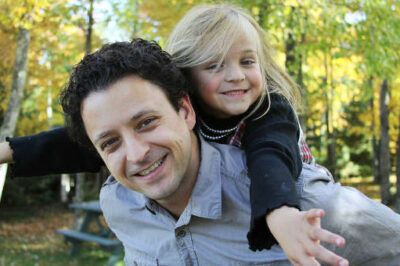As we all know, in just about any profession there are brilliant and skilled doctors who have expertise and know-how in very specific areas.
Not unlike docs in the medical, dental or psychological professions who bring their best to their patients, there is another doctor with whom most of us grew up—someone our parents turned to time and again. No, I’m not talking about Dr. Spock, who literally was the “go-to” guy for my mom as she raised me in the 60s. I’m talking about Dr. Seuss!
I love the fact that in some of his well-known children’s books he actually portrays the relationship between parents and kids. Most of us probably never really thought of it like this until now, but I think Dr. Seuss could probably enlighten us on a thing or two when it comes to father-child dynamics.
Of course the beauty of a childhood story is that we don’t always have to give much thought to every minute detail. But being that I’m a shrink, I do have a curious desire to ponder what subtle undertones might be conveyed in the classic, Hop on Pop. Let’s review what the good doctor was saying, shall we?
Here is an excerpt from about halfway through the book, and feel free to read out loud as you reconnect with your inner child:
Sad. Dad. Bad. Had.
Dad is sad.
Very, very sad
He had a bad day.
What a day Dad had!
Hop. Pop.
We like to hop.
We like to hop on top of Pop.
STOP.
Pop now finally sits up with a stern look on his face while two bewildered children sit stunned. Pop says:
You must not hop on Pop.
After this section, for some reason we don’t hear about dear Dad again until the end. Then finally, right before the last page, we’re introduced to one more important thing about Dad: We discover that he can read big words like “Constantinople” and “Timbuktu.” It’s nice to know that the father in the story is intelligent and capable, educated and sharp.
So then, what can Dr. Seuss teach us about fathering? Could there be any dad lessons tucked into these few short pages?
Let me take the liberty of highlighting a few things I’ve gleaned from this incredible read, the famous go-to handbook for fathering, Hop on Pop. With each one, I’m including important things for dads to remember in relation to their sons and daughters, stated as though your children were speaking to you:
1. Dad has emotion. We kids are very dialed in to your emotions and moods, Dad.
2. Dad doesn’t hide his sad emotions from his kids (especially his very, very sad ones). Dad, it’s okay to be real and let us see your sad emotions as well as your happy ones.
3. Kids like to play with their dad. We like it when you are approachable even on your very bad days, because we care about you.
4. Dad lets his kids get close to him even when he’s had a bad day. We need you to let us physically connect with you on good and bad days; truth be told, sometimes we need safe touch from you on our hard days too. (By the way, hugs and kisses release chemicals in the brain that counteract stress. So give more hugs and kisses on your very bad days, and you’ll feel better!)
5. Dad allows his kids to use him as a jungle gym. (Maybe it doubles as a new kind of “play therapy” to cheer Dad up after a hard day while also meeting his kids’ needs.) Dad, we know you have a limit on how much you can handle and it’s understandable when you’ve hit that point.
6. Dad has a limit on how much interaction with his kids he can handle when he’s stressed. We’d prefer that you not scream and shout at us when you’ve hit your max capacity, but we do like knowing you’re human.
7. Dad abruptly stops the connection of interactive play when he’s had enough. (Dad sets a boundary.) It’s okay to set a boundary when you need to, but please remember that you are teaching us how to handle intensity by your example.
8. Dad is smart and understands complex words and concepts. We really do like the fact that you are smart and can decode big words and concepts. We love it when you educate us on things you understand and know. And even if you can’t solve all the world’s problems, for some reason we like to believe you can.
So there you have it: a few thoughts about father-child relationships that are worth underscoring. I hope you will choose a few of these lessons and make them happen today with your son or daughter:
- Show vulnerable expression of your “softer” emotions, like sadness.
- Hug your kids even if you’ve had a bad day.
- Communicate lovingly (not abruptly) when you’ve had enough or are maxed.
- Set healthy boundaries with your kids by modeling what that looks like.
- Teach them something new so you can grow smarter together.
Thanks, Dr. Seuss, for teaching us a thing or two about little kids and big kids alike from your vast base of knowledge. We’re deeply indebted to you and are ready now to “hop” into action!
Dr. Michelle Watson has a clinical counseling practice in Portland, Oregon, and has served in that role for the past 17 years. She is founder of The Abba Project, a 9-month group forum that is designed to equip dads with daughters ages 13 to 30 to help them focus more intentionally on consistently pursuing their daughters’ hearts. She released her first book titled, Dad, Here’s What I Really Need from You: A Guide for Connecting with Your Daughter’s Heart. She invites you to visit drmichellewatson.com for more information and to sign up for her weekly Dad-Daughter Friday blogs where she provides practical tools so that every dad in America can become the action hero he wants to be and his daughter needs him to be. You can also follow or send feedback on Facebook and Twitter.
For the original article, visit fathers.com.







Leave a Comment
You must be logged in to post a comment.